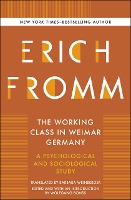"The analysis unveils a sociotypology of [the working class] on the eve of the Third Reich, its potential for resistance as well as seduction." -Political Psychology
Building upon Fromm's 1929 lecture "The Application of Psycho-Analysis to Sociology and Religious Knowledge," in which he outlined the basis for a rudimentary but far-reaching attempt at the integration of Freudian psychology with Marxist social theory, this study is an attempt to obtain evidence about the systemic connections between "psychic make-up" and social development.
Originally an investigation of the social and psychological attitudes of two large groups in Weimar Germany, manual and white-collar workers, a questionnaire was developed to collect data about their opinions, lifestyles, and attitudes-from what books they read and their thoughts on women's work to their opinions about the German legal system and the actual distribution of power in the state.
The Working Class in Weimar Germany can ultimately help us understand the establishment of fascism after 1933-that despite all the electoral successes of the Weimar Left, its members were not in the position, owning to their character structure, to prevent the victory of National Socialism.

